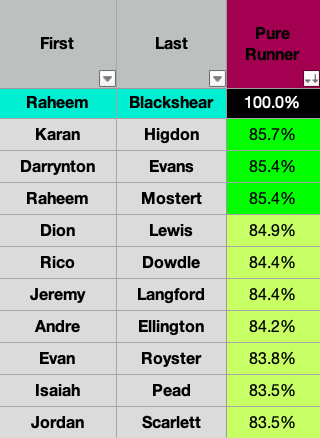Virginia Tech’s Raheem Blackshear is the next subject in a series in which I evaluate 2022 rookie running backs solely on their ability to run the ball. The Breakout Finder installments can be found here. The PlayerProfiler installments can be found here. If you happened to already catch those and don’t need a refresher on my methodology, feel free to skip to the player-focused analysis.

Virginia Tech’s Raheem Blackshear actually spent most of his five-year college career at Rutgers. His journey to an NFL Combine invite is one of the weirder among this year’s running back class. As a second-year player, he broke out with a nearly 30-percent Dominator Rating. He did this on less than 1,000 yards and only 5 TDs, with a 1-11 Rutgers team. The next year was even stranger. He caught an incredible 29 passes in only four games while vacuuming up a 31.6-percent Target Share. That number would be a 93rd-percentile mark among wide receivers.
None of that really matters much, but I say all of it to say that Blackshear had an interesting career. Let’s see how his rushing efficiency profile looks.
The Metrics
Raheem Blackshear did not play with an especially talented group of backfield teammates. They averaged a collective 2.92-star rating as high school recruits. This number ranks in the 31st-spercentile among teammates of running backs drafted since 2007. Relative to those guys, Blackshear was a tad inefficient. His career marks in YPC+ (-0.03) and Chunk Rate+ (-0.34-percent) land in the 27th and 36th-percentiles, respectively. He was a bit better in the open field, with a 35.4-percent (72nd-percentile) Breakaway Conversion Rate.
He was a low-volume player, averaging fewer than 100 carries per 12 games. And his path to yardage was relatively easy. He saw 0.14 fewer defenders in the box than what his backfield mates were carrying the ball against on average, a discrepancy in the 15th-percentile. Relative to the boxes he was facing, the average Blackshear carry was worth just 92.6-percent the output of the average non-Blackshear carry from Tech and Rutgers runners. That Box-Adjusted Efficiency Rating lands in the 9th-percentile and is the 6th-worst mark in the class.

He was also poor from a consistency standpoint. I’ve started using a metric called Relative Success Rate, which adjusts for box counts in the same way that BAE Rating does. However, where BAE Rating uses per-carry averages, RSR uses Success Rate, which describes how often a player gains an appropriate amount of yards given the down and distance situation in which he is carrying the ball. Blackshear’s career RSR was 4.2-percent lower than that of his teammates, a bottom five mark in this class. He is a sub-200 pound player who was prolific in the passing game and generally ran the ball against light box counts. But he was less efficient on the ground than his below-average teammates by pretty much any measure.
Rushing Efficiency Score and Comps
I’ve been using two different composite scores to contextualize the whole of players’ rushing efficiency profiles. The first uses all of the non-box count metrics we’ve touched on so far, in addition to overall team quality, rushing volume, offensive line play, and strength of opponent. In this Rushing Efficiency Score, Blackshear earns a 34.1 out of 100. In a composite that is centered around the box count data (and that I’m actually pretty comfortable deferring to at this point), he earns a 20.9 out of 100. Both of those numbers are in the bottom six of this class.
Based on the metrics that go into the Rushing Efficiency composite, in addition to physical measurables, I’m also able to generate similarity scores that describe how comparable players are as “pure runners.” Assuming he runs a 4.50 40-yard dash at a projected 5-8 and 199-pounds, the historical prospects most similar to him are the following:

Not a great list. Outside of Dion Lewis and maybe Andre Ellington, I’d say all of these guys were either bad in the NFL or running-backs-don’t-matter-ed their way to short-lived production.
Last Word
Raheem Blackshear is just not a good running back prospect. His name is very cool, but he doesn’t have such redeeming qualities as a ballcarrier. Do not draft him.
